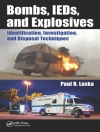‘Very thorough text that makes great use of high-profile cases to engage students and foster a passion for criminal justice.’
—Patricia Ahmed, South Dakota State University
Introduction to Criminal Justice, Second Edition, provides students with balanced, comprehensive, and up-to-date coverage of all aspects of the criminal justice system. Authors Brian K. Payne, Willard M. Oliver, and Nancy E. Marion cover criminal justice from a student-centered perspective by identifying the key issues confronting today’s criminal justice professionals. Students are presented with objective, research-driven material through an accessible and concise writing style that makes the content easier to comprehend. By exploring criminal justice from a broad and balanced perspective, students will understand how decision making is critical to the criminal justice process and their future careers.
The fully updated Second Edition has been completely revised to include new studies and current examples that are relatable to today’s students. Two new feature boxes have been added to this edition to help students comprehend and apply the content. ‘You Have the Right to…’ gives insight into several Constitutional amendments and their relationship with criminal justice today; and ‘Politics and Criminal Justice’ explores current political hot topics surrounding the justice system and the debates that occur on both sides of the political aisle.
<Cuprins
Preface
Acknowledgments
About the Authors
PART I: FOUNDATIONS OF CRIMINAL JUSTICE
Chapter 1: Introduction to Criminal Justice
The Criminal Justice System
The Justice Process
The Roles of Criminal Justice
Just the Facts: Chapter Summary
Key Terms
Critical Thinking Questions
Chapter 2: Perspectives on Crime and Criminal Justice Research
Legal Perspectives of Crime
Social Perspectives of Crime
Behavioral Perspectives of Crime
Research in Criminal Justice
Just the Facts: Chapter Summary
Key Terms
Critical Thinking Questions
Chapter 3: An Introduction to Measuring Crime and Crime Patterns
Measuring the Extent of Crime
Strategies Used to Measure the Amount of Crime
Crime Patterns
Just the Facts: Chapter Summary
Key Terms
Critical Thinking Questions
Chapter 4: An Introduction to Crime Typologies
Why Study Criminal Justice and Crime Typologies?
Violent Crime
Property Crime
Public Order Crime
Crime Within Complex Organizations
Juvenile Offending
Just the Facts: Chapter Summary
Key Terms
Critical Thinking Questions
Chapter 5: An Introduction to Criminological Theory
Why Study the Causes of Crime?
Crime as a Product of Choice
Crime as a Product of Biological Factors
Crime as a Product of Social Factors
Crime as a Product of Social Psychological Factors
Crime as a Product of Cognitive Processes
Just the Facts: Chapter Summary
Key Terms
Critical Thinking Questions
PART II: POLICING
Chapter 6: An Introduction to Policing: History and Structure
Types of Societies and Policing
The English System of Policing
The American System of Policing
Policing in America Today
The Structure of Modern Police Departments
Just the Facts: Chapter Summary
Key Terms
Critical Thinking Questions
Chapter 7: Police Strategies
Police Strategy Studies
Police Patrol Deployment
Broken Windows Theory and Policing
Community Policing
Problem-Oriented Policing
Targeted Policing
Four Related Strategies
Comp Stat
Homeland Security and Policing
Just the Facts: Chapter Summary
Key Terms
Critical Thinking Questions
Chapter 8: Issues in Policing
External Issues
Internal Issues
Just the Facts: Chapter Summary
Key Terms
Critical Thinking Questions
PART III: THE COURTS
Chapter 9: An Introduction to the Courts: History, Structure, and Actors
History of the Courts
Types of Courts
Federal Courts
State Courts
Actors: Courtroom Workgroup
Technology
Just the Facts: Chapter Summary
Key Terms
Critical Thinking Questions
Chapter 10: The Judicial Process
Arrest/Booking
The Charging Decision
Pretrial
Trial
Sentencing
Appeals
Defendants’ Rights
Just the Facts: Chapter Summary
Key Terms
Critical Thinking Questions
Chapter 11: Issues in the Courts
Issues Stemming From Overcrowding
Issues Related to Court Processes
Legal Issues Related to the Courts
Issues Related to Innovations in the Courts
Just the Facts: Chapter Summary
Key Terms
Critical Thinking Questions
PART IV: CORRECTIONS
Chapter 12: An Introduction to Corrections: History, Structure, and Actors
Goals of Punishment
History of Punishment
Structure of Corrections
Actors Working in Corrections
Just the Facts: Chapter Summary
Key Terms
Critical Thinking Questions
Chapter 13: Punishing Offenders in Prisons, Jails, and the Community
The Incarceration Experience
Releasing Inmates Back Into the Community
The Structure of Probation and Parole
Types of Alternative Sanctions
Just the Facts: Chapter Summary
Key Terms
Critical Thinking Questions
Chapter 14: Issues in Corrections
General Issues for Prisoners
General Issues for Corrections Employees
Issues Related to Working With Different Types of Offenders
Issues Related to Punishment Strategies
Learning About Corrections
Just the Facts: Chapter Summary
Key Terms
Critical Thinking Questions
PART V: CONTEMPORARY CHALLENGES
Chapter 15: Current and Future Criminal Justice Issues
International Issues
Terrorism
Cybercrime
The Aging of the Criminal Justice System
The Evolution of Criminal Justice Policies
Concluding Remarks
Just the Facts: Chapter Summary
Key Terms
Critical Thinking Questions
Appendix: Constitution of the United States
Admissible or Inadmissible Evidence Answer Key
Beyond a Reasonable Doubt Answer Key
Glossary
Notes
Index
Despre autor
Nancy Marion is currently a professor and chair of the Political Science Department at the University of Akron. Her teaching and research interests revolve around the interplay of politics and criminal justice. She has authored over 30 peer-reviewed journal articles and over 30 books that examine how politics affects criminal justice, and in turn, how criminal justice issues can affect political events, particularly elections. She holds a BA from The Pennsylvania State University in Administration of Justice; an MA in Justice from American University; and MA and Ph D in Political Science from the State University of New York at Binghamton. She recently earned a JD from The University of Akron.












